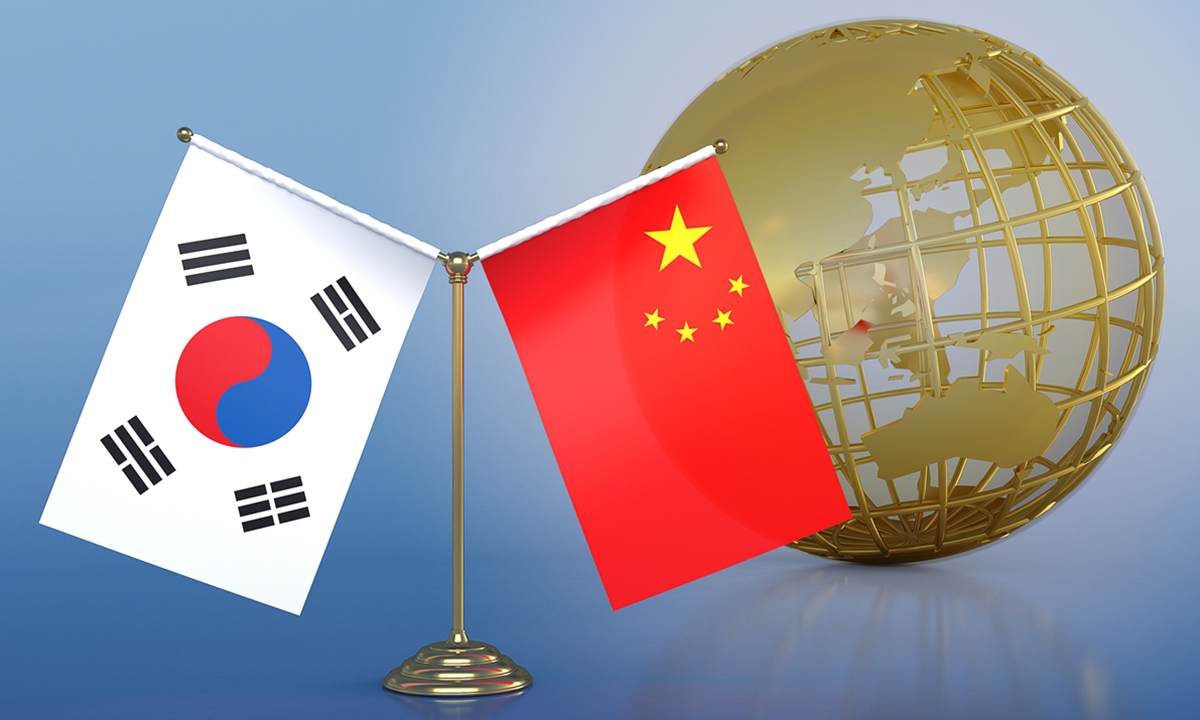GT Voice: Deeper trade ties crucial for China, S.Korea to defy external pressure

China South Korea Photo:VCG
China and South Korea are increasingly recognizing the importance of enhancing cooperation to tackle external challenges together amid complex geopolitical pressures, particularly in light of the US attempts to "decouple" from China.
Chinese Premier Li Qiang and South Korean President Yoon Suk-yeol agreed on Sunday to accelerate the second phase of their free trade agreement (FTA) negotiations, the Xinhua News Agency reported.
The decision not only affirms the results of the first phase of FTA cooperation but also sends a clear signal of deepening economic and trade collaboration. This news, which preceded Monday's ninth Trilateral Summit Meeting among China, Japan and South Korea, holds great significance for progress in the China-Japan-South Korea FTA negotiations and promoting regional economic integration under the ASEAN plus China, Japan and South Korea (ASEAN+3) framework.
Since the China-South Korea FTA was signed in 2015, economic and trade cooperation has made substantial progress. The two sides have cut tariffs several times since 2015. In December 2017, the two countries jointly announced the launch of the second phase of the China-South Korea FTA negotiations, which is China's first negotiation on services trade and investment liberalization of negative lists.
Nevertheless, the strategic suppression of China by the US has significantly affected South Korea's economic and trade ties with China. The Biden administration is pushing for an expansion of the military alliance with South Korea to include economic and technological cooperation.
In particular, under the guise of "economic security," the US has forced South Korea to join the "Chip Alliance," and disrupted the supply chain between China and South Korea by imposing restrictions on bilateral collaboration in cutting-edge sectors like semiconductors.
In 2023, South Korea recorded a trade deficit of $17.5 billion with China for the first time in 31 years, according to Statistics Korea. Also, foreign direct investment by South Korean companies into China slumped 78.1 percent to $1.87 billion in 2023. These figures show the difficulties that the US has brought to economic and trade cooperation between China and South Korea.
The industrial and supply chains of China and South Korea are deeply intertwined. For South Korea, the loss of the Chinese market because of American pressure will lead to a huge demand gap, which cannot be fully compensated by the US and European markets and may risk driving the South Korean economy into trouble.
Against this backdrop, the willingness of the two countries to accelerate FTA negotiations undoubtedly shows their determination to seek cooperation to withstand external pressure and interference.
Moreover, the recognition that cooperation and development constitute the unstoppable mainstream of China-South Korea relations will serve as a powerful example for FTA negotiations among China, Japan and South Korea, ultimately fostering economic integration within the ASEAN+3 framework.
The second phase of FTA talks may inevitably face challenges, especially when it comes to trade issues in sensitive areas. In the face of these potential conflicts, the two sides need not only to strengthen communication and coordination through the establishment of a more effective negotiation mechanism, but also to demonstrate greater flexibility and creativity in the talks so as to find effective ways to resolve their differences.
History and practice have proved that China and South Korea have always been partners with mutual needs. It is paramount for them to firmly grasp the general direction of mutually beneficial cooperation and never allow the stable development of bilateral economic ties to be derailed by external interference.
图说省实党建之窗
- 09-29567《剑网3》逐鹿中原将首测 秦皇陵第一手爆料
- 09-29981晋城有70多个屋顶发电站 年发电175万千瓦时
- 09-291195网媒山西行记者团运城采风 司马温公祠展示华夏历史
- 09-291552网媒山西行记者团运城采风 司马温公祠展示华夏历史
- 09-29788《星际争霸2》异虫 手绘各种异虫单位
- 09-29508网媒山西行记者团运城采风 司马温公祠展示华夏历史
- 09-291633惨痛!太原中环路开通至今22人横穿马路车祸身亡
- 09-291822015平遥国际摄影大展盛装开幕
- 09-291185中手游应书岭:全球化分工、全球化发行
- 09-291954山西:10月1日起 非实名用户通信服务将受影响


